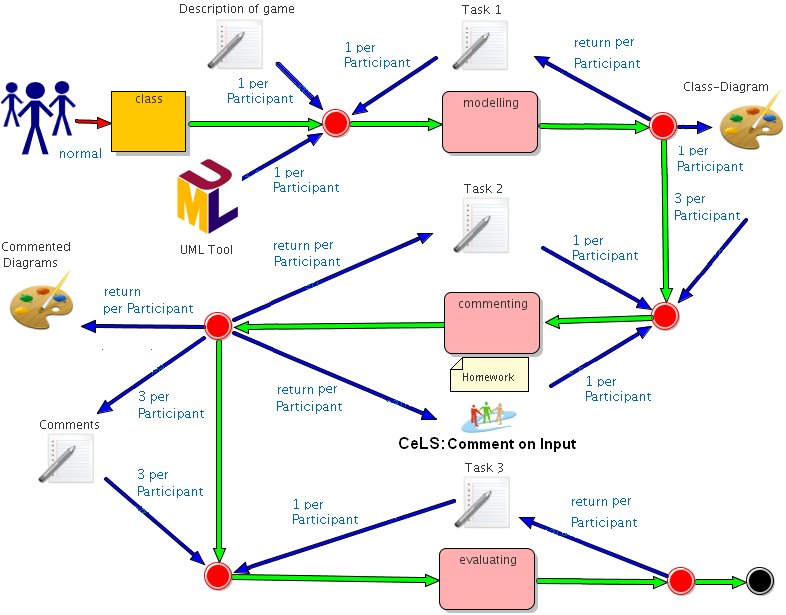MoCoLaDe: Difference between revisions
Jump to navigation
Jump to search
m (Created page with '{{Stub}} Category: Educational technologies Category: Collaborative learning Category: XML Category: Authoring tools [[Category: Educational modeling languages]…') |
m (using an external editor) |
||
| Line 1: | Line 1: | ||
{{Stub}} | {{Stub}} | ||
The graphical language MoCoLADe (Model for Collaborative Learning Activity Design) is a '''script design tool''', an authoring tool for designing and modeling educational scripts. | |||
See also: [[Collage LD]], a similar British tool (but that as of June 2009 does not interface with a system). | |||
{{quotationbox|The graphical notation MoCoLADe has been designed for the formal modeling of collaboration scripts based on the conceptual framework of Kobbe et al (2008). The notation provides means to model group formation, assignment of roles and documents to groups or individuals and the definition of temporal dependencies between activities. The dynamic features of the script can be simulated interactively, so that a teacher can check if the script works with her/his class given a specific setup of students, documents etc. The first prototype of the graphical editing tool was tested with several CSCL scripts from the literature to show the soundness of our modeling approach (Harrer, Kobbe & Malzahn, 2007). To allow the execution in existing e-learning platforms, the output of simulation runs and models in the IMS/LD format is possible; a mapping to other learning platforms [is possible]. (Harrer, 2009). | |||
}} | |||
== The tool == | |||
Here is a screendump from Harrer et al. 2009. | |||
[[image:mocolade-cels-2009.jpg|frame|none|MoCoLaDe and CeLS]] | |||
I have no idea how far this product is operational, still under active development and/or available - [[User:Daniel K. Schneider|Daniel K. Schneider]] 14:11, 1 July 2009 (UTC). | |||
== Links == | |||
== Bibliography == | |||
* Harrer, Andreas, Dan Kohen-Vacs, Benedikt Roth, Nils Malzahn, Ulrich Hoppe, Miky Ronen (2009). Design and Enactment of Collaboration Scripts – an integrative approach with graphical notations and learning platforms, CSCL '09, Poster [http://ltee.org/uploads/cscl2009/poster178.pdf PDF]. | |||
* Harrer, A. Kobbe, L. and Malzahn. N. (2007) Conceptual and computational issues in the formalization of collaboration scripts. In Clark Chinn, Gijsbert Erkens, and Sadhana Puntambekar, editors, Mice, Minds, and Society, The Computer Supported Collaborative Learning (CSCL) Conference 2007, volume 8. International Society of the Learning Sciences, 2007. | |||
* Harrer, A., Malzahn, N. and Hoppe, U. (2007) Graphical Modeling and Simulation of Learning Designs, in Tsukasa Hirashima and Ulrich Hoppe and Shelley Shwu-Ching Young (eds.), ''Supporting Learning Flow through Integrative Technologies,'', IOS Press, Amsterdam, Frontiers in Artificial Intelligence and Applications, Vol. 162, 291-294 ([http://www.booksonline.iospress.nl/Content/View.aspx?piid=7564 PDF] {{ar}}. | |||
* Harrer, Andreas and Ulrich Hoppe (2007) Visual Modeling of Collaborative Learning Processes: Uses, Desired Properties, and Approaches in | |||
* Kobbe, L., Weinberger, A., Dillenbourg, P., Harrer, A., and Häkkinen, P. (2008). Specifying computer-supported collaboration scripts. Accepted for Intâl Journal of CSCL. | |||
Revision as of 15:11, 1 July 2009
The graphical language MoCoLADe (Model for Collaborative Learning Activity Design) is a script design tool, an authoring tool for designing and modeling educational scripts.
See also: Collage LD, a similar British tool (but that as of June 2009 does not interface with a system).
The graphical notation MoCoLADe has been designed for the formal modeling of collaboration scripts based on the conceptual framework of Kobbe et al (2008). The notation provides means to model group formation, assignment of roles and documents to groups or individuals and the definition of temporal dependencies between activities. The dynamic features of the script can be simulated interactively, so that a teacher can check if the script works with her/his class given a specific setup of students, documents etc. The first prototype of the graphical editing tool was tested with several CSCL scripts from the literature to show the soundness of our modeling approach (Harrer, Kobbe & Malzahn, 2007). To allow the execution in existing e-learning platforms, the output of simulation runs and models in the IMS/LD format is possible; a mapping to other learning platforms [is possible]. (Harrer, 2009).
The tool
Here is a screendump from Harrer et al. 2009.
I have no idea how far this product is operational, still under active development and/or available - Daniel K. Schneider 14:11, 1 July 2009 (UTC).
Links
Bibliography
- Harrer, Andreas, Dan Kohen-Vacs, Benedikt Roth, Nils Malzahn, Ulrich Hoppe, Miky Ronen (2009). Design and Enactment of Collaboration Scripts – an integrative approach with graphical notations and learning platforms, CSCL '09, Poster PDF.
- Harrer, A. Kobbe, L. and Malzahn. N. (2007) Conceptual and computational issues in the formalization of collaboration scripts. In Clark Chinn, Gijsbert Erkens, and Sadhana Puntambekar, editors, Mice, Minds, and Society, The Computer Supported Collaborative Learning (CSCL) Conference 2007, volume 8. International Society of the Learning Sciences, 2007.
- Harrer, A., Malzahn, N. and Hoppe, U. (2007) Graphical Modeling and Simulation of Learning Designs, in Tsukasa Hirashima and Ulrich Hoppe and Shelley Shwu-Ching Young (eds.), Supporting Learning Flow through Integrative Technologies,, IOS Press, Amsterdam, Frontiers in Artificial Intelligence and Applications, Vol. 162, 291-294 (PDF (Access restricted).
- Harrer, Andreas and Ulrich Hoppe (2007) Visual Modeling of Collaborative Learning Processes: Uses, Desired Properties, and Approaches in
- Kobbe, L., Weinberger, A., Dillenbourg, P., Harrer, A., and Häkkinen, P. (2008). Specifying computer-supported collaboration scripts. Accepted for Intâl Journal of CSCL.
